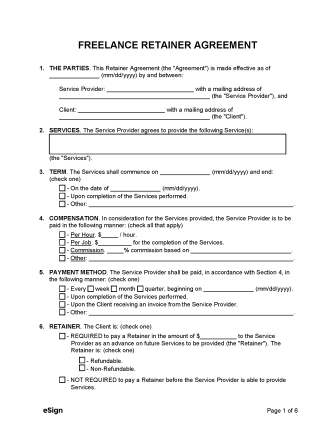

A freelance retainer agreement sets the terms of a working relationship where a client prepays to reserve the professional services of a freelancer. With the advance payment (known as a “retainer fee”), the client is guaranteed to receive a certain amount of work within a designated period. The retainer fee amount will be specified in the agreement, as well as details concerning the services being retained, billing, work permits, licensing, and confidentiality requirements.
The retainer fee is an initial expense the client must pay to guarantee accessibility to the freelancer’s professional services. It contributes to the total cost of services , but must be paid before any work is actually performed.
Important Notes:
Freelance retainer agreements will identify the individual or entity requesting services (the client) and the person hired to provide those services (the freelancer).
The “effective date” refers to the time both parties become legally bound to obligations established under the retainer agreement.
A service description is an essential feature of a retainer agreement. It provides the parties the ability to clearly define the role of the freelancer and detail their responsibilities in advance to eliminate uncertainty.
The term is the period in which the freelancer agrees to provide services. This section will specify the commencement date (i.e., when the freelancer starts working) and the date or other circumstance upon which the freelancer’s service obligations end.
A retainer agreement explains how much and by what means the freelancer will be compensated. Several payment options are available with this particular agreement: flat fee, hourly rate, commission percentage, or some other agreed-upon payment structure. The compensation terms will also establish the amount of the upfront retainer fee.
The agreement includes rules for how freelancers or clients can terminate the contract before the end of the agreed-upon term.
Generally speaking, retainer agreements should be used if the freelancer wants a predictable workflow with a reliable source of recurring income. Retainers are often used when a freelancer renders services on an ongoing basis, typically over a period of several months to one year.
There are a variety of reasons why freelancers might find a retainer more beneficial than a traditional, one-off service contract. Some of the benefits of a retainer include: